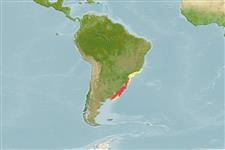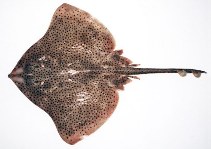Atlantoraja castelnaui (MirandaRibeiro, 1907)
Spotback skate
Add your observation in Fish Watcher
| Native range | All suitable habitat | Point map | Year 2050 |

|
| This map was computer-generated and has not yet been reviewed. |
| Atlantoraja castelnaui AquaMaps Data sources: GBIF OBIS |
Upload your photos and videos
Pictures | Google imageAtlantoraja castelnaui
Picture by Martins, I.A.
Pictures | Google imageAtlantoraja castelnaui
Picture by Martins, I.A.
Argentina country information
Common names:
[No common name]
Occurrence: native
Salinity: marine
Abundance: | Ref:
Importance: | Ref:
Aquaculture: | Ref:
Regulations: | Ref:
Uses: no uses
Comments: Range extension, found in San Jorge Gulf, 5° southwards from its known distribution. Collected at 46°39' S, 65°52' W (Ref. 86990). Also Ref. 33524.
National Checklist: Argentina
Country Information: https://www.cia.gov/library/publications/resources/the-world-factbook/geos/ar.html
National Fisheries Authority:
Occurrences: Occurrences Point map
Main Ref: Menni, R.C. and L.O. Lucifora, 2007
National Database:
Occurrence: native
Salinity: marine
Abundance: | Ref:
Importance: | Ref:
Aquaculture: | Ref:
Regulations: | Ref:
Uses: no uses
Comments: Range extension, found in San Jorge Gulf, 5° southwards from its known distribution. Collected at 46°39' S, 65°52' W (Ref. 86990). Also Ref. 33524.
National Checklist: Argentina
Country Information: https://www.cia.gov/library/publications/resources/the-world-factbook/geos/ar.html
National Fisheries Authority:
Occurrences: Occurrences Point map
Main Ref: Menni, R.C. and L.O. Lucifora, 2007
National Database:
Common names from other countries
Classification / Names Common names | Synonyms | Catalog of Fishes(genus, species) | ITIS | CoL | WoRMS | Cloffa
Elasmobranchii (sharks and rays) > Rajiformes (Skates and rays) > Arhynchobatidae (Softnose skates)
Etymology: Atlantoraja: Greek, atlantes = havin the strenght of Atlas, the god that supported the pillar s of the universe in the Greek mithology + Latin, raja = ray (Raja sp.) (Ref. 45335).
Eponymy: Francis(co) Louis Nompar de Caumont, Comte de Laporte de Castelnau (1810–1880) was a career diplomat and naturalist who was born in London, studied natural science in Paris, and then led a French scientific expedition to study the lakes of Canada, [...] (Ref. 128868), visit book page.
Etymology: Atlantoraja: Greek, atlantes = havin the strenght of Atlas, the god that supported the pillar s of the universe in the Greek mithology + Latin, raja = ray (Raja sp.) (Ref. 45335).
Eponymy: Francis(co) Louis Nompar de Caumont, Comte de Laporte de Castelnau (1810–1880) was a career diplomat and naturalist who was born in London, studied natural science in Paris, and then led a French scientific expedition to study the lakes of Canada, [...] (Ref. 128868), visit book page.
Environment: milieu / climate zone / depth range / distribution range Ecology
Marine; demersal; depth range 10 - 100 m (Ref. 57911). Subtropical; 20°S - 40°S, 60°W - 40°W (Ref. 57911)
Distribution Countries | FAO areas | Ecosystems | Occurrences | Point map | Introductions | Faunafri
Southwest Atlantic: Brazil, Uruguay and Argentina.
Length at first maturity / Size / Weight / Age
Maturity: Lm 105.0 range ? - ? cm
Max length : 132 cm TL male/unsexed; (Ref. 57911); common length : 45.0 cm TL male/unsexed; (Ref. 6077)
Max length : 132 cm TL male/unsexed; (Ref. 57911); common length : 45.0 cm TL male/unsexed; (Ref. 6077)
Oviparous. Distinct pairing with embrace. Young may tend to follow large objects, such as their mother (Ref. 205). Eggs are oblong capsules with stiff pointed horns at the corners deposited in sandy or muddy flats (Ref. 205). Egg capsule measures 92-103 mm long and 72-80 mm wide (Ref. 41249). Utilized as fishmeal (Ref. 6077).
Life cycle and mating behavior Maturity | Reproduction | Spawning | Eggs | Fecundity | Larvae
Oviparous, paired eggs are laid. Embryos feed solely on yolk (Ref. 50449). Distinct pairing with embrace. Young may tend to follow large objects, such as their mother (Ref. 205).
Main reference
Upload your references | References | Coordinator : McEachran, John | Collaborators
McEachran, J.D. and K.A. Dunn, 1998. Phylogenetic analysis of skates, a morphologically conservative clade of elasmobranchs (Chondrichthyes: Rajidae). Copeia 1998(2):271-290. (Ref. 27314)
IUCN Red List Status (Ref. 130435: Version 2024-2)
Critically Endangered (CR) (A2bd); Date assessed: 01 July 2019
Threat to humans
Harmless
Human uses
Fisheries: of no interest
FAO(Publication : search) | FishSource | Sea Around Us
More information
Population dynamics
Growth parameters
Max. ages / sizes
Length-weight rel.
Length-length rel.
Length-frequencies
Mass conversion
Recruitment
Abundance
Growth parameters
Max. ages / sizes
Length-weight rel.
Length-length rel.
Length-frequencies
Mass conversion
Recruitment
Abundance
Life cycle
Reproduction
Maturity
Fecundity
Spawning
Spawning aggregations
Eggs
Egg development
Larvae
Larval dynamics
Reproduction
Maturity
Fecundity
Spawning
Spawning aggregations
Eggs
Egg development
Larvae
Larval dynamics
Anatomy
Gill area
Brain
Otolith
Gill area
Brain
Otolith
Physiology
Body composition
Nutrients
Oxygen consumption
Swimming type
Swimming speed
Visual pigments
Fish sound
Diseases & Parasites
Toxicity (LC50s)
Body composition
Nutrients
Oxygen consumption
Swimming type
Swimming speed
Visual pigments
Fish sound
Diseases & Parasites
Toxicity (LC50s)
Genetics
Genetics
Heterozygosity
Heritability
Genetics
Heterozygosity
Heritability
Human related
Aquaculture systems
Aquaculture profiles
Strains
Ciguatera cases
Stamps, coins, misc.
Aquaculture systems
Aquaculture profiles
Strains
Ciguatera cases
Stamps, coins, misc.
Tools
E-book | Field guide | Identification keys | Length-frequency wizard | Life-history tool | Point map | Classification Tree
| Catch-MSY |
Special reports
Download XML
Internet sources
Aquatic Commons | BHL | Cloffa | BOLDSystems | Websites from users | Check FishWatcher | CISTI | Catalog of Fishes(genus, species) | DiscoverLife | ECOTOX | Faunafri | Fishtrace | GenBank(genome, nucleotide) | GloBI | GOBASE | | Google Books | Google Scholar | Google | IGFA World Record | MitoFish | National databases | Otolith Atlas of Taiwan Fishes | PubMed | Reef Life Survey | Scirus | SeaLifeBase | Tree of Life | Wikipedia(Go, Search) | World Records Freshwater Fishing | Zoological Record
Estimates based on models
Preferred temperature (Ref. 115969): 10.6 - 23.2, mean 17.1 (based on 116 cells).
Phylogenetic diversity index (Ref. 82804): PD50 = 0.6250 [Uniqueness, from 0.5 = low to 2.0 = high].
Bayesian length-weight: a=0.00562 (0.00288 - 0.01097), b=3.11 (2.94 - 3.28), in cm Total Length, based on LWR estimates for this (Sub)family-body shape (Ref. 93245).
Trophic level (Ref. 69278): 4.5 ±0.80 se; based on food items.
Resilience (Ref. 120179): Low, minimum population doubling time 4.5 - 14 years (Fec assumed to be <100).
Fishing Vulnerability (Ref. 59153): Very high vulnerability (79 of 100).




